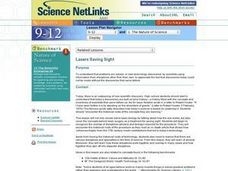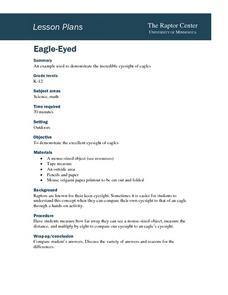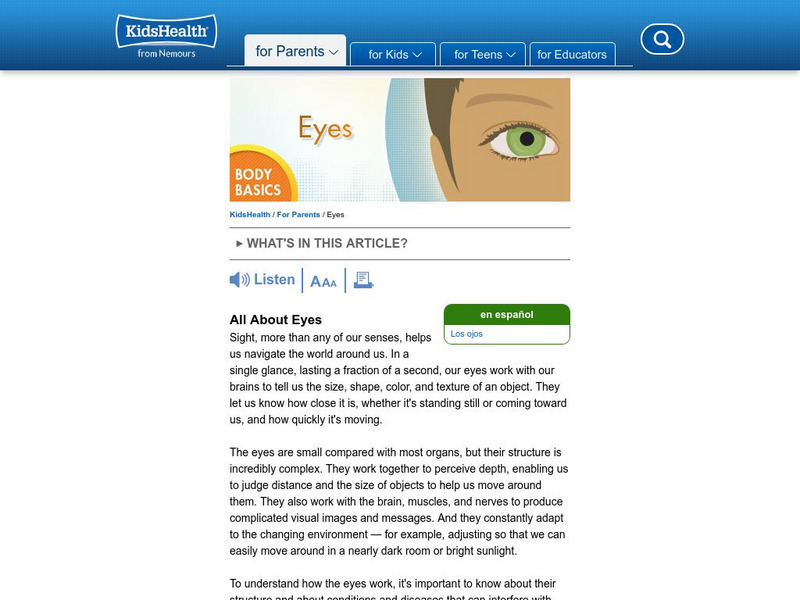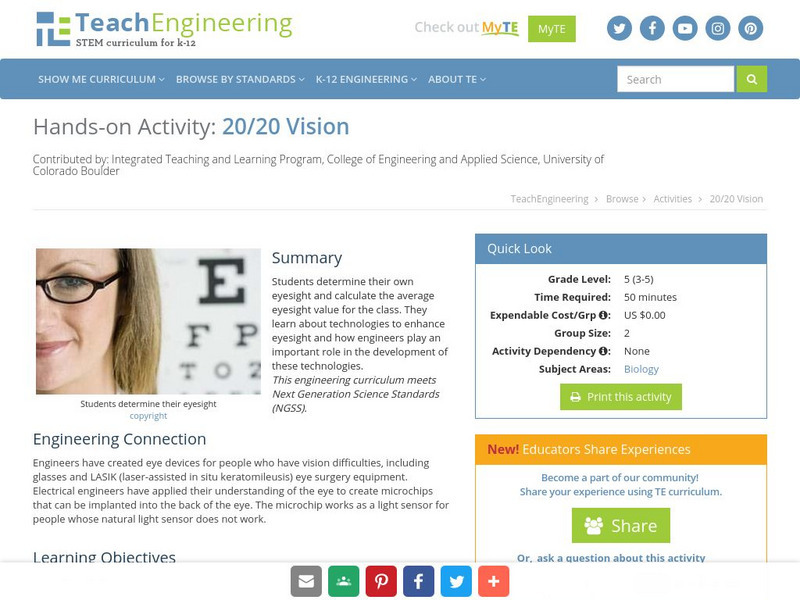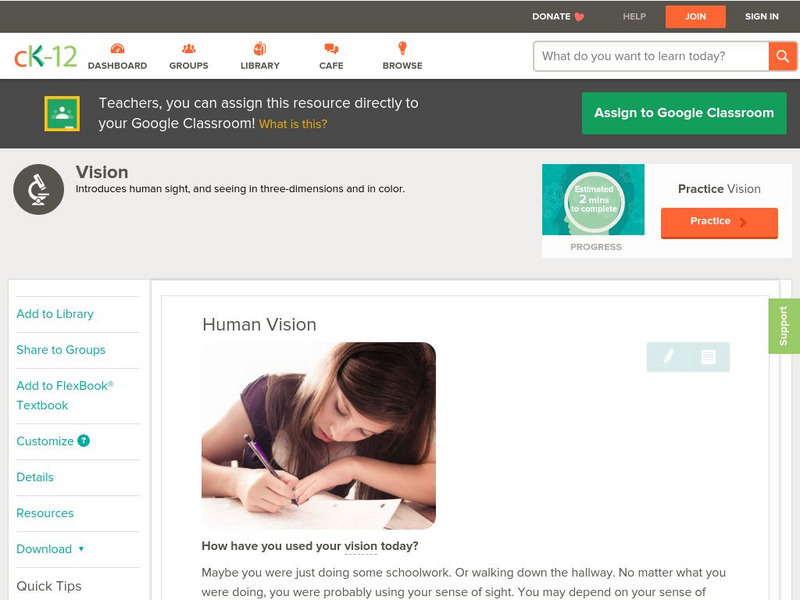Curated OER
Understanding Eyeglasses
Kids wonder about eyeglasses, and why people have to wear eyeglasses. This should shed some light on the subject. Learners develop an understanding about eyelgasses, and also other visual aids, such as magnifying glasses. In fact, they...
Curated OER
20/20 Vision
Students determine their own eyesight and calculate what a good average eyesight value for the class would be. They examine how technology enhances eyesight and how engineers play an important role in the development of these technologies.
Curated OER
Would You Believe Your Eyes?
Learners study the parts and functions of the human eye. They create dodecagons which are twelve-sided figures with twelve equal angles and share these with the class so that each student can begin to see how many different illusions can...
Curated OER
Interpreting Medical Data
Students explore human anatomy by graphing scientific data. In this vision lesson, students discuss how ophthalmology works and take their own eye assessment test using the Snellen chart. Students collect vision data from all of their...
Curated OER
Lasers Saving Sight
Students review some basic biology by talking about how the eye works. They cover the concepts behind laser surgery as a treatment for saving sight. They begin to recognize the overlap of disciplines (physics and biology) required for...
Curated OER
Eagle-Eyed
Students study the eyesight of eagles. They discuss raptors and their eyesight and compare it to their own. They measure how far away they can see a small object and its distance. They calculate the eyesight to measure an eagle's...
Curated OER
You Won't Believe Your Eyes!
Students gain a basic understanding of the sense of sight. They watch a video on sight, then engage in some vocabulary games, and perform some simple experiments which focus on the basics of sight.
Curated OER
How We See: The First Steps of Human Vision
Students notice how various images and colors update constantly as they are affected by factors such as distance, background and lighting. They also examine how optometrists developed a standard to evaluate eyesight.
Society for Science and the Public
Science News for Students: Fuzzy Future
This article explains how too much time indoors as children may be leading to vision problems in young people, especially myopia. Article includes a vocabulary list and a printable word search.
Curated OER
Kids Health: Taking Care of Your Vision
Vision is something that can sometimes be taken for granted until a problem arises. Find out why taking care of your eyes is so important as well as procedure that insure proper eyesight.
Curated OER
Kids Health: Eyes
The anatomy of the eye, how it functions to allow us to see, and vision problems that can develop are described.
TeachEngineering
Teach Engineering: Biomedical Devices for the Eyes
Middle schoolers examine the structure and function of the human eye, learning some amazing features about our eyes, which provide us with sight and an understanding of our surroundings. Students also learn about some common eye problems...
San Diego Zoo Global
San Diego Zoo: Bald Eagle
This resource presents a complete fact sheet on bald eagles that includes a look at why bald eagles are "bald," what bald eagles eat, how their vision works, their courtship and mating behavior, their nesting and reproductive behaviors,...
Physics Classroom
The Physics Classroom: Refraction and the Ray Model of Light
Six complete lessons on refraction and the ray model of light. Tutorials include informational text, interactive activities, animations, and quick, interactive comprehension checks along the way.
TED Talks
Ted: Ted Ed: A Curable Condition That Causes Blindness
Andrew Bastawrous gives the facts on cataracts and blindness. [4:23]
TeachEngineering
Teach Engineering: 20/20 Vision
In this activity, students determine their own eyesight and calculate what a good average eyesight value for the class would be. Students learn about technologies to enhance eyesight and how engineers play an important role in the...
WebMD
Web Md: Hyperopia or Farsightedness
An informative site on hyperopia (or better known as farsightedness). It discusses what it is, what causes it, some of the symptoms, and how it is diagnosed and treated.
CK-12 Foundation
Ck 12: Life Science: Human Vision
[Free Registration/Login may be required to access all resource tools.] Sight, or vision, is the ability to see light. It depends on the eyes detecting light and forming images. It also depends on the brain making sense of the images, so...
Physics Classroom
The Physics Classroom: Refraction/ray Model of Light: Image Formation/detection
Students discover the four parts of the eye are the most instrumental in the task of producing images that are discernible by the brain.
Physics Classroom
The Physics Classroom: Refraction/ray Model of Light: Farsightedness/correction
A brief introduction to the physics side of farsightedness, and how lenses correct this vision defect.
Physics Classroom
The Physics Classroom: Refraction/ray Model of Light: Nearsightedness/correction
A brief introduction to the physics side of nearsightedness, and how lenses correct this vision defect.
CK-12 Foundation
Ck 12: Life Science: 11.49 Vision Correction
See how vision correction affects a person's eyesight.
PBS
Pbs Teachers:peripheral Vision
Investigate how well you see movement, color, shape and detail with your peripheral vision, and compare your results with that of another person.
Other
Understanding Race: Age Related Macular Degeneration
This interesting site ties an immune system response to infection early in life to age-related macular degeneration presenting itself later in life.






